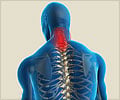A new study has shown that a topical spray could decrease pain in kids undergoing intravenous procedures.
A topical spray may decrease pain in kids undergoing intravenous procedures, a new study has found.
In the study, the spray reduced pain by 34 percent in children undergoing intravenous procedures, such as injections and tube insertions (cannulation), compared with a placebo group.According to researchers, the findings from this double blind, randomised controlled trial have clinical implications.
"The vapocoolant spray that we used provided quick and effective reduction of pain due to intravenous cannulation without delaying the procedure," Dr. William Splinter and colleagues said.
"This feature is especially important when time is limited, such as in a busy office practice or emergency department, where topical methods of pain relief have not traditionally been available," he added.
The study also showed that successful insertion of a needle or tube was more frequent after using the vapocoolant spray.
"Effective pain relief combined with improved success on first cannulation attempt results in fewer repeat attempts, decreased procedure times and improved satisfaction among children, parents and health care providers," the researchers said.
Advertisement
For the study, Dr. William Splinter and colleagues looked at 80 children aged 6-12 who required urgent intravenous procedures within 30-45 minutes at the Children's Hospital of Eastern Ottawa.
Advertisement
The findings are significant, as 'prior studies of vapocoolant sprays did not show a reduction in pain due to intravenous cannulation in children.'
Source-ANI
RAS/L










